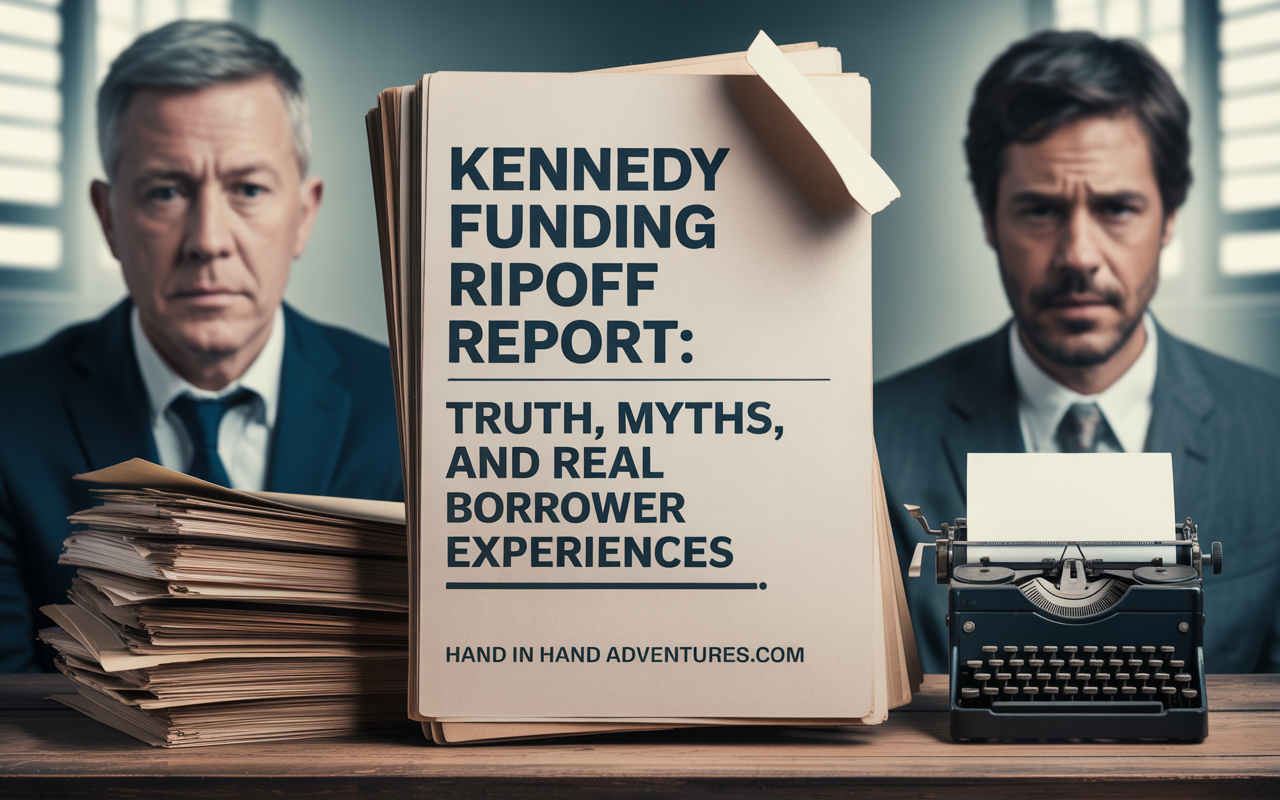Private lending has long been a gray area in real estate financing. Companies that specialize in fast, high-risk funding often attract both praise and criticism. One name that frequently surfaces in online discussions is Kennedy Funding. Over the years, it has been the subject of several Ripoff Reports, complaints, and online discussions. But is there any truth behind the “Kennedy Funding Ripoff Report,” or are these allegations just misunderstandings in the risky world of private lending?
This article dives deep into the claims, real borrower experiences, public information, and expert insights surrounding Kennedy Funding Ripoff Report, separating fact from fiction and providing guidance to those considering private financing.
Understanding Kennedy Funding
Kennedy Funding, headquartered in Englewood Cliffs, New Jersey, is a private commercial real estate lender specializing in bridge loans, land acquisitions, development financing, and bankruptcy workouts. The company operates in a niche space — helping developers and investors secure financing when traditional banks turn them away.
On paper, this sounds beneficial. Kennedy Funding positions itself as a “lifeline” for borrowers who need quick access to capital for complex deals. However, this very nature of high-risk lending also brings challenges — often leading to misunderstandings, unmet expectations, and, at times, heated disputes that spill into platforms like Ripoff Report.
What the Kennedy Funding Ripoff Report Is All About
The Kennedy Funding Ripoff Report consists of numerous online complaints filed by borrowers or partners claiming to have faced issues such as undisclosed fees, delayed funding, or miscommunication. While some accounts sound concerning, it’s crucial to remember that Ripoff Report is a public platform that allows anyone to post without verification.
However, repeated themes across multiple independent sources can indicate underlying issues worth examining closely.
Common Complaints Found in the Kennedy Funding Ripoff Report
Borrowers have reported several recurring issues when working with Kennedy Funding. Below is a summary of the most common ones:
| Complaint Type | Borrower Allegation |
|---|---|
| High Upfront Fees | Large “due diligence” or “commitment” fees paid upfront with limited refunds if the deal fails. |
| Transparency Issues | Borrowers claim key loan terms changed after initial agreements or were not fully disclosed. |
| Funding Delays | Some clients mention extended timelines and postponed closings. |
| Customer Service Problems | Complaints about unresponsive representatives and poor communication. |
| Aggressive Recovery Tactics | Reports of rigid or harsh collection methods when payments were missed. |
Investigating the Ripoff Report Claims
While the allegations above sound alarming, context is essential; hard money lending is an inherently risky business. Borrowers often approach lenders like Kennedy Funding when they cannot meet conventional loan requirements — meaning the terms are naturally more stringent and expensive.
Furthermore, some of the negative reviews may stem from failed deals, incomplete applications, or borrowers misunderstanding complex terms. Still, when the same types of complaints repeat across several independent sources, it signals deeper issues in transparency and communication.
Kennedy Funding’s Public Response
To its credit, Kennedy Funding has not stayed silent about these reports. The company has engaged with Ripoff Report’s Corporate Advocacy Program, a reputation management initiative that allows businesses to address and respond to consumer complaints publicly.
This suggests the lender acknowledges the importance of resolving disputes and maintaining credibility in a competitive market. However, participation doesn’t mean all issues are resolved — it simply shows that the company is taking a proactive approach to reputation management.
Legal and Regulatory Standing
As of the most recent records, there is no verifiable court ruling labeling Kennedy Funding as fraudulent or illegal. The company remains active in the private lending space and continues to close deals globally. This indicates operational legitimacy despite the wave of online criticism.
Still, potential borrowers should always verify whether a lender holds the necessary state licensing, complies with financial regulations, and maintains transparent documentation practices.
Why Hard Money Lenders Often Face Ripoff Reports
Many hard money lenders — not just Kennedy Funding — attract Ripoff Reports. Why? Because the private lending world operates differently from traditional banking:
-
Higher Risk Equals Higher Costs: These loans often involve distressed assets or borrowers with limited credit, so fees and interest rates are much steeper.
-
Fast Turnaround Pressure: The promise of “fast funding” can create unrealistic borrower expectations.
-
Complex Legal Documents: Borrowers sometimes overlook fine print that can drastically affect repayment obligations.
-
Non-Refundable Fees: Many private lenders require upfront fees to cover due diligence — but these fees can be lost if the loan doesn’t close.
Hence, while borrowers may feel misled, lenders often argue they followed the contract terms strictly.
Analyzing Credibility: Are the Kennedy Funding Ripoff Reports Reliable?
Not all online complaints carry the same weight. Some reports are detailed, including documentation and transaction records. Others lack evidence and may even be posted anonymously.
Therefore, assessing credibility requires:
-
Consistency: Are multiple independent borrowers reporting similar issues?
-
Evidence: Does the complaint include contract details, dates, and specific communication?
-
Resolution: Has the company responded or resolved the issue?
From what can be observed, Kennedy Funding’s Ripoff Reports include both legitimate grievances and vague claims. It’s a mix of real dissatisfaction and the noise of online frustration.
Real Borrower Experiences
Across forums, several borrowers acknowledge that Kennedy Funding eventually delivered on its commitments but at a cost higher than expected. Others report successful deals but note that the process required persistence and patience.
On the other hand, a smaller portion of borrowers claim they lost substantial upfront fees when deals fell apart. Whether these failures were due to Kennedy Funding’s process or borrower circumstances remains unclear.
How to Protect Yourself When Dealing with Private Lenders
If you are considering working with Kennedy Funding or a similar lender, you can take steps to safeguard your interests:
-
Hire an Attorney: Always have a real estate or finance attorney review contracts before signing.
-
Request Full Fee Disclosure: Ask for a written breakdown of every fee — upfront, recurring, and conditional.
-
Understand “Non-Refundable” Terms: Make sure you know which fees can’t be recovered if the deal doesn’t close.
-
Check Online Reputation: Look for consistent feedback, not isolated negative reviews.
-
Avoid Rushing: Even if you need fast funding, take time to evaluate your options.
Kennedy Funding Ripoff Report: The Bigger Picture
The phrase “Kennedy Funding Ripoff Report” has become a lightning rod for discussions about private lending ethics. But it’s more than just one company’s reputation — it’s a reflection of the tension between desperate borrowers and high-risk lenders.
Kennedy Funding operates within an industry where risk, urgency, and large sums of money collide. Misunderstandings are inevitable, but transparency and clear communication can minimize conflict.
Should You Avoid Kennedy Funding?
Not necessarily. Kennedy Funding has completed numerous successful deals across the United States and internationally. However, they may not be suitable for every borrower. Those unfamiliar with private lending should proceed cautiously and educate themselves before committing to any agreement.
Conclusion
The Kennedy Funding Ripoff Report reveals a complex picture — a mix of real borrower grievances and the inherent friction of high-stakes private lending. Kennedy Funding is not a proven scam, but its reputation for aggressive terms and steep fees suggests it’s best suited for experienced borrowers who understand the risks.
If you proceed with Kennedy Funding, do so with your eyes open, your documents reviewed, and your expectations realistic. Transparency, due diligence, and legal support can help turn a potentially risky venture into a successful partnership.

